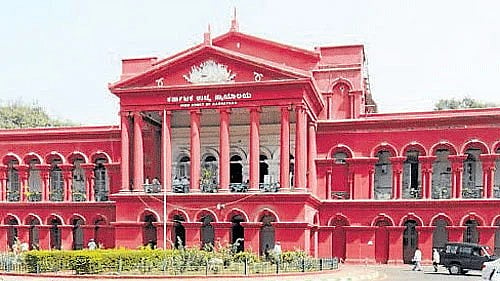
The Karnataka High Court
Credit: DH File Photo
The high court has dismissed petitions seeking to exclude sugar from the purview of the Jute Packaging Materials (Compulsory Use in Packing Commodities) Act, 1987.
The petitions, filed by the South Indian Sugar Mills Association, Karnataka and the Indian Sugar Mills Association, challenged various notifications issued by the Union government mandating that 20% of sugar manufactured must be packed in jute bags.
The mandatory jute packaging material to be used in the foodgrains industry is to the tune of 100% and in the sugar industry to the tune of 20%. The petitioners submitted that the notifications aimed solely at promoting the jute industry and pose a health hazard to citizens. It was contended that the jute to be converted to bags must use jute batching oil for the packing of food materials like sugar.
The petitioners cited various reports wherein it is stated that the use of jute batching oil for weaving jute into bags is tumorigenic (something that tends to produce tumours).
According to the petitioners, governments in Punjab, Haryana and Andhra Pradesh have all cited concerns on the contamination of jute batching oil with sugar and its consequent health concerns.
The Additional Solicitor General of India (ASG) submitted that the Act’s mandate cannot be relaxed for the convenience of the sugar industry. It was submitted that the notifications are the product of several deliberations of the committee, approved by the prime minister, all in the interest of farmers.
Justice M Nagaprasanna noted the observations of the Apex Court while considering the enactment, when the use of jute bags was 100% in the sugar industry and 70% in the cement industry. The Apex Court had pointed out that the economic policy to render socio-economic justice to growers of raw jute and workmen was based on the constitutional policy under the Directive Principles of State Policy.
“Once the compulsion of 100% packaging upon the sugar industry was upheld by the Supreme Court, the present grievance against a mere 20% reservation can scarcely aspire to higher favour,” Justice Nagaprasanna said.
The court said, “The jute batching oil, after its use, is again covered by another thin layer to block perforation and pilferage of sugar or dropping out of sugar, causing moisture of sugar, owing to its hygroscopic nature. Since this has been in use, all of which can be analysed for the ensuing year by the Standing Advisory Committee. This court would hold its hands in declaration that it is carcinogenic, without the report at the outset being placed before the Standing Advisory Committee. This Court holds that the imposition of 20% of jute bags in the sugar industry is neither arbitrary nor unreasonable.”
